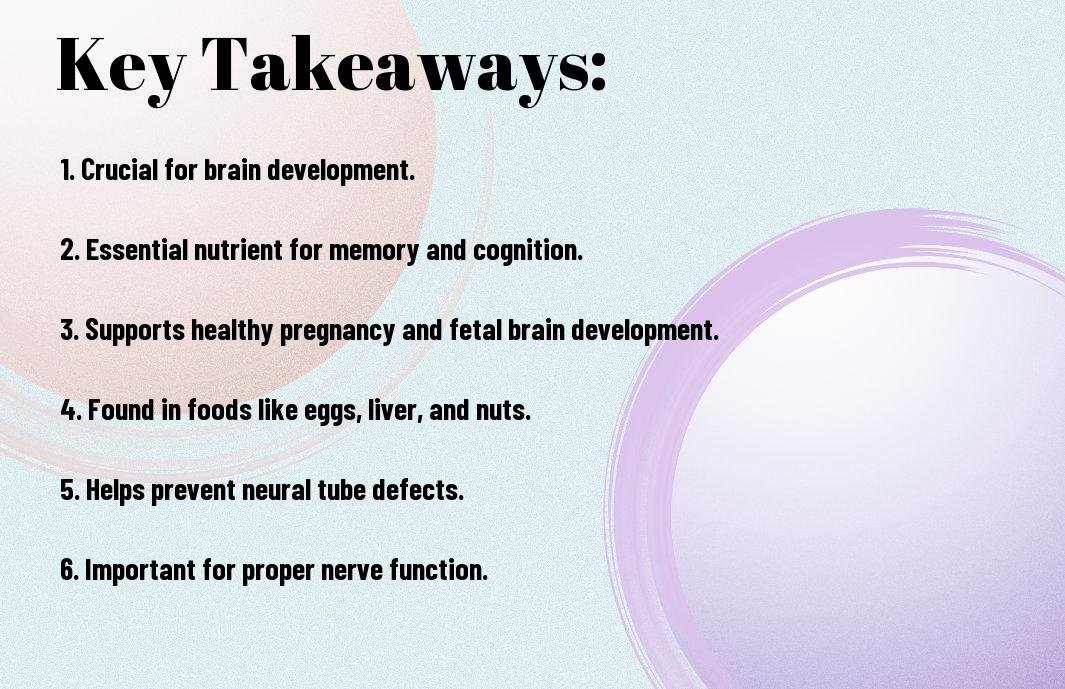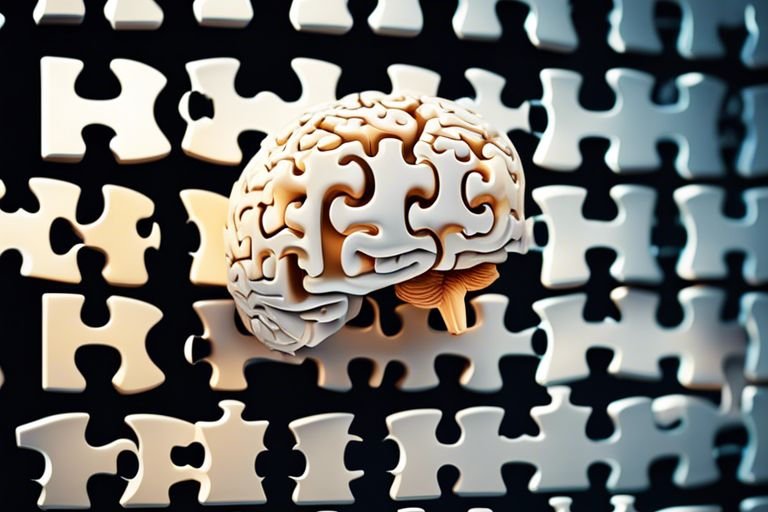As you go about your daily routine, your brain is working tirelessly behind the scenes to keep you focused, alert, and functioning at your best. But did you know that there’s a crucial nutrient that plays a starring role in supporting your brain health? Choline, a lesser-known but mighty important compound, is important for cognitive function, memory, and even fetal development during pregnancy. In this article, we’ll probe into the fascinating world of choline, exploring its benefits, food sources, and why it’s more important than ever to prioritize this nutrient in your diet.

Key Takeaways:
- Brain Function and Development: Choline is a crucial nutrient for brain health, playing a key role in the structure and function of brain cells. It is converted into acetylcholine in the brain, a neurotransmitter that facilitates communication between brain cells and is involved in many functions, including memory formation, attention, and regulation of the autonomic nervous system.
- Pregnancy and Fetal Development: Choline is important for fetal brain development during pregnancy. Adequate choline intake has been shown to improve cognitive function and memory in offspring, and may even reduce the risk of neurodevelopmental disorders such as schizophrenia and autism.
- Dietary Sources and Supplementation: While choline can be found in foods such as eggs, meat, and fish, many people do not get enough from their diet alone. Supplementing with choline, particularly during pregnancy, may be necessary to ensure adequate intake and support optimal brain health and fetal development.

The Importance of Choline
For optimal brain function and a healthy pregnancy, choline plays a vital role. This vital nutrient is involved in many bodily processes, making it a crucial component of your overall well-being.
Brain Function and Development
To support your brain’s ability to focus, think critically, and store memories, choline is converted into acetylcholine, a neurotransmitter that facilitates communication between brain cells. With adequate choline intake, you can improve your cognitive function, enhancing your daily productivity and mental clarity.
Pregnancy and Fetal Development
Importance of choline during pregnancy cannot be overstated, as it directly impacts the development of your baby’s brain and spinal cord. Choline deficiency during this critical period can lead to lifelong cognitive and behavioral deficits in your child.
Pregnancy is a time of rapid growth and development, and choline is vital for supporting your baby’s brain development. Research has shown that maternal choline intake during pregnancy influences the structure and function of the fetal brain, particularly in regions responsible for attention, memory, and emotional regulation. By ensuring adequate choline intake during pregnancy, you can give your child the best possible start in life.
Benefits of Choline
If you’re looking to support your brain health and pregnancy, choline is an imperative nutrient that offers a wide range of benefits. From improving cognitive function to supporting neuroplasticity, choline plays a critical role in maintaining optimal brain function.
Improving Cognitive Function
Better cognitive function is just one of the many benefits of choline. By increasing the production of neurotransmitters, such as acetylcholine, choline helps improve your memory, attention, and processing speed. This means you’ll be able to stay focused, think more clearly, and make better decisions.
Supporting Neuroplasticity
On top of its cognitive benefits, choline also supports neuroplasticity, the brain’s ability to adapt and change in response to new experiences. This is especially important during pregnancy, as it helps your baby’s brain develop and mature properly. In fact, according to a study by University Hospitals, Choline in Pregnancy Supports Baby’s Brain Development.
Choline’s role in supporting neuroplasticity is crucial for learning and memory formation. When you consume adequate amounts of choline, you’re providing your brain with the necessary building blocks to create new neural connections and strengthen existing ones. This means you’ll be better equipped to learn new skills, remember important information, and adapt to changing situations.

Food Sources and Supplements
All you need to know about getting enough choline in your diet is that it’s readily available in various food sources and supplements. Let’s probe the details.
Rich Food Sources of Choline
Foods rich in choline include egg yolks, lean meats, fish, soybeans, cruciferous vegetables like broccoli and cauliflower, and nuts. You can also find choline in smaller amounts in dairy products, whole grains, and legumes. Incorporating these foods into your diet can help you meet your daily choline needs.
Choline Supplements: When and How to Take Them
To ensure you’re getting enough choline, especially during pregnancy or if you’re vegetarian or vegan, consider taking a supplement. Look for supplements that contain alpha-GPC (L-alpha-glycerylphosphorylcholine) or phosphatidylcholine, which are easily absorbed by the body.
Sources recommend taking choline supplements with food to minimize stomach upset. Start with a small dose of 250-500 mg per day and gradually increase as needed. It’s vital to consult with your healthcare provider before taking any supplements, especially if you have underlying medical conditions or take medications.
Conclusion
Following this journey into the world of choline, you now possess a deeper understanding of the imperative role it plays in maintaining your brain health and supporting a healthy pregnancy. As you move forward, remember that incorporating choline-rich foods into your diet can have a profound impact on your cognitive function, memory, and overall well-being. By making informed choices about your nutrition, you’re taking a crucial step towards unlocking your full potential and giving your future children the best possible start in life.
FAQ
Q: What is choline and why is it important for brain health?
A: Choline is a vital nutrient that plays a crucial role in various bodily functions, particularly in brain development and function. It is a precursor to the neurotransmitter acetylcholine, which is responsible for regulating memory, attention, and cognitive function. Choline is also involved in the synthesis of phospholipids, which are important components of brain cell membranes. Adequate choline intake has been shown to improve cognitive performance, memory, and mood, making it an important nutrient for brain health.
Q: How does choline support fetal brain development during pregnancy?
A: Choline is critical for fetal brain development during pregnancy. It helps to regulate the expression of genes involved in brain development and function, and supports the formation of brain structures and neural connections. Maternal choline intake has been shown to improve cognitive function and memory in offspring, and may even reduce the risk of neurodevelopmental disorders such as schizophrenia and autism. Furthermore, choline supplementation during pregnancy has been linked to improved infant cognitive development and reduced risk of attention deficit hyperactivity disorder (ADHD).
Q: How can I ensure I’m getting enough choline in my diet, especially during pregnancy?
A: Choline can be found in various food sources, including eggs, meat, fish, soybeans, and cruciferous vegetables like broccoli and cauliflower. However, it’s often difficult to get enough choline through diet alone, especially during pregnancy when demand is higher. Pregnant women can consider taking a choline supplement, such as alpha-GPC or choline bitartrate, after consulting with their healthcare provider. Additionally, foods fortified with choline, such as prenatal vitamins and some energy bars, can also help meet daily needs. Aim to consume at least 450-550 mg of choline per day, and up to 930 mg during pregnancy and lactation.
